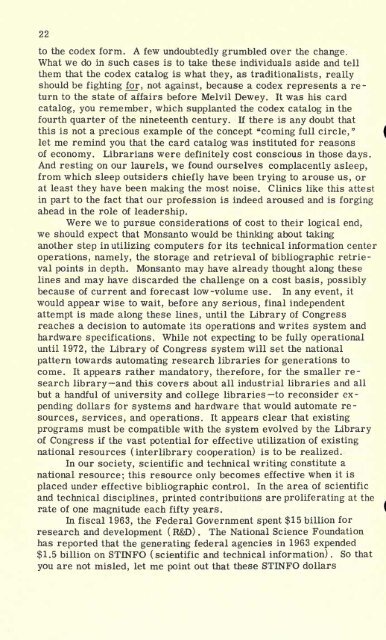Proceedings of the 1964 Clinic on Library Applications of ... - ideals
Proceedings of the 1964 Clinic on Library Applications of ... - ideals
Proceedings of the 1964 Clinic on Library Applications of ... - ideals
You also want an ePaper? Increase the reach of your titles
YUMPU automatically turns print PDFs into web optimized ePapers that Google loves.
22<br />
to <str<strong>on</strong>g>the</str<strong>on</strong>g> codex form. A few undoubtedly grumbled over <str<strong>on</strong>g>the</str<strong>on</strong>g> change.<br />
What we do in such cases is to take <str<strong>on</strong>g>the</str<strong>on</strong>g>se individuals aside and tell<br />
<str<strong>on</strong>g>the</str<strong>on</strong>g>m that <str<strong>on</strong>g>the</str<strong>on</strong>g> codex catalog is what <str<strong>on</strong>g>the</str<strong>on</strong>g>y, as traditi<strong>on</strong>alists, really<br />
should be fighting for, not against, because a codex represents a return<br />
to <str<strong>on</strong>g>the</str<strong>on</strong>g> state <str<strong>on</strong>g>of</str<strong>on</strong>g> affairs before Melvil Dewey. It was his card<br />
catalog, you remember, which supplanted <str<strong>on</strong>g>the</str<strong>on</strong>g> codex catalog in <str<strong>on</strong>g>the</str<strong>on</strong>g><br />
fourth quarter <str<strong>on</strong>g>of</str<strong>on</strong>g> <str<strong>on</strong>g>the</str<strong>on</strong>g> nineteenth century. If <str<strong>on</strong>g>the</str<strong>on</strong>g>re is any doubt that<br />
this is not a precious example <str<strong>on</strong>g>of</str<strong>on</strong>g> <str<strong>on</strong>g>the</str<strong>on</strong>g> c<strong>on</strong>cept "coming full circle,"<br />
let me remind you that <str<strong>on</strong>g>the</str<strong>on</strong>g> card catalog was instituted for reas<strong>on</strong>s<br />
<str<strong>on</strong>g>of</str<strong>on</strong>g> ec<strong>on</strong>omy. Librarians were definitely cost c<strong>on</strong>scious in those days.<br />
And resting <strong>on</strong> our laurels, we found ourselves complacently asleep,<br />
from which sleep outsiders chiefly have been trying to arouse us, or<br />
at least <str<strong>on</strong>g>the</str<strong>on</strong>g>y have been making <str<strong>on</strong>g>the</str<strong>on</strong>g> most noise. <str<strong>on</strong>g>Clinic</str<strong>on</strong>g>s like this attest<br />
in part to <str<strong>on</strong>g>the</str<strong>on</strong>g> fact that our pr<str<strong>on</strong>g>of</str<strong>on</strong>g>essi<strong>on</strong> is indeed aroused and is forging<br />
ahead in <str<strong>on</strong>g>the</str<strong>on</strong>g> role <str<strong>on</strong>g>of</str<strong>on</strong>g> leadership.<br />
Were we to pursue c<strong>on</strong>siderati<strong>on</strong>s <str<strong>on</strong>g>of</str<strong>on</strong>g> cost to <str<strong>on</strong>g>the</str<strong>on</strong>g>ir logical end,<br />
we should expect that M<strong>on</strong>santo would be thinking about taking<br />
ano<str<strong>on</strong>g>the</str<strong>on</strong>g>r step in utilizing computers for its technical informati<strong>on</strong> center<br />
operati<strong>on</strong>s, namely, <str<strong>on</strong>g>the</str<strong>on</strong>g> storage and retrieval <str<strong>on</strong>g>of</str<strong>on</strong>g> bibliographic retrieval<br />
points in depth. M<strong>on</strong>santo may have already thought al<strong>on</strong>g <str<strong>on</strong>g>the</str<strong>on</strong>g>se<br />
lines and may have discarded <str<strong>on</strong>g>the</str<strong>on</strong>g> challenge <strong>on</strong> a cost basis, possibly<br />
because <str<strong>on</strong>g>of</str<strong>on</strong>g> current and forecast low -volume use. In any event, it<br />
would appear wise to wait, before any serious, final independent<br />
attempt is made al<strong>on</strong>g <str<strong>on</strong>g>the</str<strong>on</strong>g>se lines, until <str<strong>on</strong>g>the</str<strong>on</strong>g> <strong>Library</strong> <str<strong>on</strong>g>of</str<strong>on</strong>g> C<strong>on</strong>gress<br />
reaches a decisi<strong>on</strong> to automate its operati<strong>on</strong>s and writes system and<br />
hardware specificati<strong>on</strong>s. While not expecting to be fully operati<strong>on</strong>al<br />
until 1972, <str<strong>on</strong>g>the</str<strong>on</strong>g> <strong>Library</strong> <str<strong>on</strong>g>of</str<strong>on</strong>g> C<strong>on</strong>gress system will set <str<strong>on</strong>g>the</str<strong>on</strong>g> nati<strong>on</strong>al<br />
pattern towards automating research libraries for generati<strong>on</strong>s to<br />
come. It appears ra<str<strong>on</strong>g>the</str<strong>on</strong>g>r mandatory, <str<strong>on</strong>g>the</str<strong>on</strong>g>refore, for <str<strong>on</strong>g>the</str<strong>on</strong>g> smaller research<br />
library and this covers about all industrial libraries and all<br />
but a handful <str<strong>on</strong>g>of</str<strong>on</strong>g> university and college libraries to rec<strong>on</strong>sider expending<br />
dollars for systems and hardware that would automate resources,<br />
services, and operati<strong>on</strong>s. It appears clear that existing<br />
programs must be compatible with <str<strong>on</strong>g>the</str<strong>on</strong>g> system evolved by <str<strong>on</strong>g>the</str<strong>on</strong>g> <strong>Library</strong><br />
<str<strong>on</strong>g>of</str<strong>on</strong>g> C<strong>on</strong>gress if <str<strong>on</strong>g>the</str<strong>on</strong>g> vast potential for effective utilizati<strong>on</strong> <str<strong>on</strong>g>of</str<strong>on</strong>g> existing<br />
nati<strong>on</strong>al resources ( interlibrary cooperati<strong>on</strong>) is to be realized.<br />
In our society, scientific and technical writing c<strong>on</strong>stitute a<br />
nati<strong>on</strong>al resource; this resource <strong>on</strong>ly becomes effective when it is<br />
placed under effective bibliographic c<strong>on</strong>trol. In <str<strong>on</strong>g>the</str<strong>on</strong>g> area <str<strong>on</strong>g>of</str<strong>on</strong>g> scientific<br />
and technical disciplines, printed c<strong>on</strong>tributi<strong>on</strong>s are proliferating at <str<strong>on</strong>g>the</str<strong>on</strong>g><br />
rate <str<strong>on</strong>g>of</str<strong>on</strong>g> <strong>on</strong>e magnitude each fifty years.<br />
In fiscal 1963, <str<strong>on</strong>g>the</str<strong>on</strong>g> Federal Government spent $15 billi<strong>on</strong> for<br />
research and development ( R&D) . The Nati<strong>on</strong>al Science Foundati<strong>on</strong><br />
has reported that <str<strong>on</strong>g>the</str<strong>on</strong>g> generating federal agencies in 1963 expended<br />
$1.5 billi<strong>on</strong> <strong>on</strong> STINFO (scientific and technical informati<strong>on</strong>) . So that<br />
you are not misled, let me point out that <str<strong>on</strong>g>the</str<strong>on</strong>g>se STINFO dollars
















